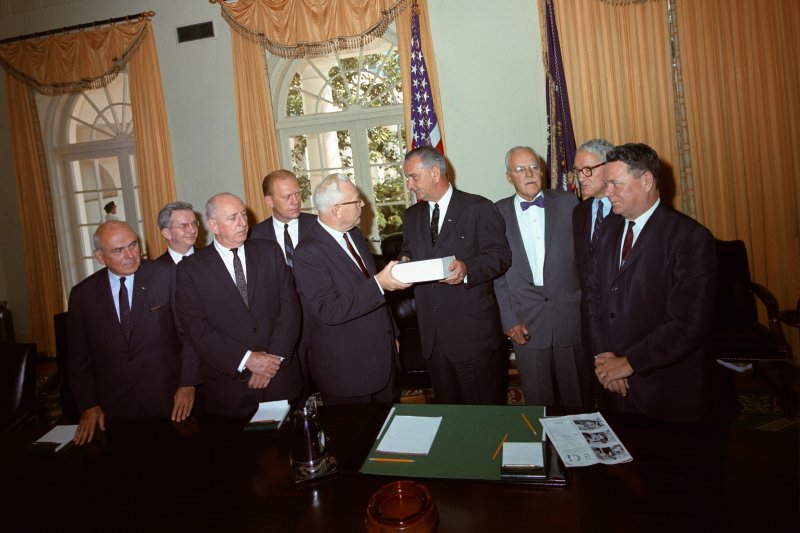1 of 4 | Members of the Warren Commission present their report on the assassination of President John F. Kennedy to President Lyndon B. Johnson on September 24, 1964. From L-R: John McCloy, J. Lee Rankin (general counsel), Sen. Richard Russell, Rep. Gerald Ford, Chief Justice Earl Warren, President Lyndon B. Johnson, Allen Dulles, Sen. John Sherman Cooper and Rep. Hale Boggs. File Photo by LBJ Library/UPI
Sept. 24 (UPI) -- On this date in history:
The Judiciary Act of 1789 was passed by Congress and signed by President George Washington, establishing the Supreme Court of the United States as a tribunal made up of six justices who were to serve on the court until death or retirement. The number of justices became nine in 1869.
In 1929, aviator James Doolittle demonstrated the first "blind" takeoff and landing, using only instruments to guide his aircraft.
In 1942, as World War II raged, popular bandleader Glenn Miller ended his long-running radio show and announced he was going into the U.S. Army. He was succeeded on radio by Harry James.
In 1957, U.S. President Dwight D. Eisenhower sent the 101st Airborne Division to Little Rock, Ark., to enforce the Supreme Court's desegregation decision.
In 1959, U.S. President Dwight Eisenhower and Soviet Premier Nikita Khrushchev met at Camp David, Md.
In 1964, Chief Justice Earl Warren hand-delivered to President Lyndon B. Johnson the Warren Commission report on the assassination of President John F. Kennedy a year prior.
In 1986, the U.S. Congress adopted the rose as the national flower.
In 1998, Iran's foreign minister announced the country had dropped its 1989 call for the death of Salman Rushdie, author of The Satanic Verses, which many Muslims found blasphemous.
In 2007, about 73,000 members of the United Auto Workers went on strike against General Motors after contract negotiations bogged down over wages and benefits. The walkout ended within two days.
File Photo by Brian Kersey/UPI
In 2009, the discovery of a treasure trove of more than 1,500 finely crafted gold, silver and copper artifacts, found with a metal detector and believed buried by seventh-century Anglo-Saxon rulers, was termed one of most important in British archaeological history.
In 2013, authorities in southwest Pakistan said a 7.7-magnitude earthquake in Balochistan province killed at least 500 people and destroyed hundreds of houses throughout the region.
In 2014, U.S. President Barack Obama, speaking at the United Nations, said countries must band together to destroy the "network of death" of Islamic State terrorists. "No God condones this terror," Obama said. "No grievance justifies these actions. There can be no reasoning -- no negotiation -- with this brand of evil. The only language understood by killers like this is the language of force."
File Photo by Monika Graff/UPI


















